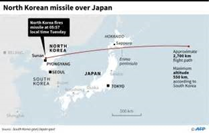According to the South Korean military, a ballistic missile was launched from Sunan in the North Korean capital of Pyongyang and landed 3700 kilometers, approximately 2300 miles, away in the Pacific Ocean. South Korea then had a “live fire drill.” They launched a missile from their East Coast, which, according to their Joint Chiefs of Staff, would have been able to hit Sunan. This was a show of power to warn North Korea that South Korea will not just stand by. South Korean President Moon Jae-in held a national security meeting on the day of the launch to discuss if any further action should be taken.
In Japan, there was a J-Alert, a government announcement informing the public that the missile informing the public that the missile had passed over Hokkaido had passed over Hokkaido and that people should stay away from any debris. The Japanese Coast Guard has yet to report any damage. Japanese Prime Minister Shinzo Abe called the missile “totally unacceptable” and said that it goes against the “international community’s will for peace.” He called for other countries to help send a message to North Korea that if this behavior does not stop, there will be repercussions.
Kim Jong-un has tested more missiles than his father and grandfather combined. South Korea has been looking to make peace with North Korea. However, they have been carrying out missile tests of their own. President Moon feels that South Korea still needs to develop their military more and does not want to rush into a nuclear arms race.
President Trump has not made a comment on the North Korean missile launch yet. However, Japan and the United States want the United Nations Security Council to hold “urgent consultations.” China accounts for 90% of North Korean imports. U.S. Secretary of State Rex
Tillerson mentioned that Chinese oil supplies and Russia’s use of North Korean migrant workers would be prime areas where those countries can take direct action against North Korea and let Kim Jong-un know that the UN will not stand for his actions. The White House’s plan of action is “peaceful pressure,” in which they build a global coalition to isolate North Korea economically and
diplomatically.













